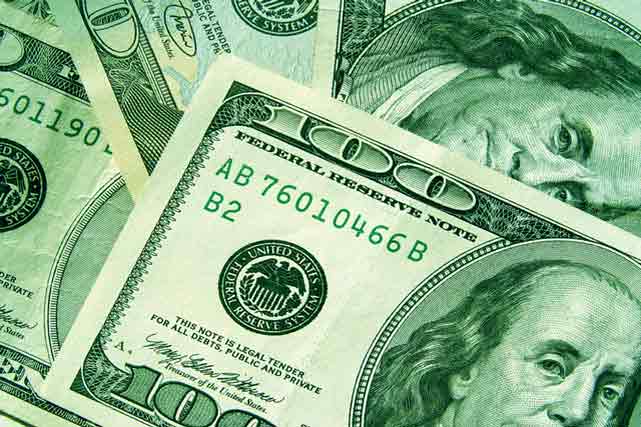Pound Sterling to Dollar Forecast: BoE Rethink After Inflation Data
- Written by
Frank Davies

The Pound to Dollar (GBP/USD) exchange rate fell to 1-week lows near 1.3320 after UK inflation data fuelled fresh speculation that the Bank of England could resume rate cuts this year
GBP/USD dipped to 1-week lows just below 1.3320 as the dollar held firm.
A slump in gold prices after a surge to fresh record highs helped underpin the dollar, although equity markets made gains which should provide some net support the Pound.
The huge moves across precious metals will increase the risk of a wider increase in volatility.
Commerzbank commented; “We are dealing with an absolutely exceptional year for gold."
UoB is not convinced that the Pound slide will continue; “Downward momentum has increased slightly, but rather than a continued decline, GBP is likely to edge lower within a lower range of 1.3310/1.3435.”
JP Morgan sees scope for losses to at least 1.3200 unless the pair can rebreak back above 1.3475.
Transatlantic interest rate expectations will remain a key driver of exchange rates.
Markets are still expecting Fed rate cuts in October and December with a further cut early next year.
ING commented; “the dollar could have extended gains up to current levels on the back of US sentiment stabilisation, but a further USD rally from here will be harder to justify unless markets find reasons to price out one of the three Fed cuts expected by March.
With analysts divided over whether the Bank of England delivers another cut this year, the next few weeks could see sharp GBP/USD swings. For readers with currency purchase needs or upcoming transfers, it may be prudent to track rate movements closely — see the latest live comparisons for guidance on timing and provider options.
The headline UK inflation rate held at 3.8% for September compared with consensus forecasts of an increase to 4.0% while the core rate declined slightly to 3.5% from 3.6% and compared with expectations of a slight increase to 3.7%.
Food prices declined 0.2% on the month with the annual increase slowing to 4.5% from 5.1%.
The goods inflation rate increased slightly to 2.9% from 2.8% with the services-sector rate unchanged at 4.7%.
Following the data, there was a shift in expectations surrounding Bank of England policy.
Markets have priced in a cut fully by February compared with March previously and there has been fresh speculation that there could be a move this year.
Matthew Ryan, head of market strategy at Ebury noted conflicting pressures; “The MPC is stuck between a rock and a hard place. The cooling in Britain’s jobs market is screaming out for further reductions in the base rate, but high inflation warrants a need for caution.”
He added; “We think that most officials will probably need to see more evidence that inflation has indeed peaked, but today’s data does at least mark a step in the right direction.”
ING commented; “Markets are pricing in 10bp of easing for December, which leaves ample room for potential dovish repricing hitting the pound in the coming weeks – even if our official call still narrowly favours February for the next cut.”
STORY LINK Pound Sterling to Dollar Forecast: BoE Rethink After Inflation Data

The Pound to Dollar (GBP/USD) exchange rate fell to 1-week lows near 1.3320 after UK inflation data fuelled fresh speculation that the Bank of England could resume rate cuts this year
GBP/USD Forecasts: Slide to 1-Week Low
GBP/USD dipped to 1-week lows just below 1.3320 as the dollar held firm.
A slump in gold prices after a surge to fresh record highs helped underpin the dollar, although equity markets made gains which should provide some net support the Pound.
The huge moves across precious metals will increase the risk of a wider increase in volatility.
Commerzbank commented; “We are dealing with an absolutely exceptional year for gold."
UoB is not convinced that the Pound slide will continue; “Downward momentum has increased slightly, but rather than a continued decline, GBP is likely to edge lower within a lower range of 1.3310/1.3435.”
Save on Your GBP/USD Transfer
Get better rates and lower fees on your next international money transfer. Compare TorFX with top UK banks in seconds and see how much you could save.
Transatlantic interest rate expectations will remain a key driver of exchange rates.
Markets are still expecting Fed rate cuts in October and December with a further cut early next year.
ING commented; “the dollar could have extended gains up to current levels on the back of US sentiment stabilisation, but a further USD rally from here will be harder to justify unless markets find reasons to price out one of the three Fed cuts expected by March.
With analysts divided over whether the Bank of England delivers another cut this year, the next few weeks could see sharp GBP/USD swings. For readers with currency purchase needs or upcoming transfers, it may be prudent to track rate movements closely — see the latest live comparisons for guidance on timing and provider options.
The headline UK inflation rate held at 3.8% for September compared with consensus forecasts of an increase to 4.0% while the core rate declined slightly to 3.5% from 3.6% and compared with expectations of a slight increase to 3.7%.
Food prices declined 0.2% on the month with the annual increase slowing to 4.5% from 5.1%.
The goods inflation rate increased slightly to 2.9% from 2.8% with the services-sector rate unchanged at 4.7%.
Following the data, there was a shift in expectations surrounding Bank of England policy.
Markets have priced in a cut fully by February compared with March previously and there has been fresh speculation that there could be a move this year.
Matthew Ryan, head of market strategy at Ebury noted conflicting pressures; “The MPC is stuck between a rock and a hard place. The cooling in Britain’s jobs market is screaming out for further reductions in the base rate, but high inflation warrants a need for caution.”
He added; “We think that most officials will probably need to see more evidence that inflation has indeed peaked, but today’s data does at least mark a step in the right direction.”
ING commented; “Markets are pricing in 10bp of easing for December, which leaves ample room for potential dovish repricing hitting the pound in the coming weeks – even if our official call still narrowly favours February for the next cut.”
International Money Transfer? Ask our resident FX expert a money transfer question or try John's new, free, no-obligation personal service! ,where he helps every step of the way, ensuring you get the best exchange rates on your currency requirements.
TAGS: Pound Dollar Forecasts
Comments are currrently disabled
Related Stories:
- Pound-to-Dollar Forecast: Can GBP/USD Break Out of the 1.33 Range? - December 15, 2025
- British Pound to Dollar Forecast: GBP/USD Holds 1.34 Despite UK Recession Fears - December 12, 2025
- GBP to USD Forecast: Pound Sterling Softens on UK Economic Concerns - December 11, 2025
- Pound to Dollar Rate JUMPS as FED to Pause After Today's Rate Cut - December 10, 2025
- Pound to Dollar Price Forecast: GBP Steady with "Dots to Dictate Reaction" - December 10, 2025
- British Pound-to-Dollar Forecast: GBP Struggles to Hold 1.33 Ahead of Fed - December 10, 2025
- GBP to USD Forecast: Pound Sterling Rangebound While Fed Uncertainty Builds - December 9, 2025
- Pound Sterling to Dollar Forecast: GBP Consolidation - December 9, 2025
- GBP to USD Forecast: Pound Sterling Drifts on Leadership Uncertainty, Fed Watch - December 8, 2025
Latest News:
- Euro to Dollar Forecast: EUR/USD Near 1.18 as Fed Uncertainty Dominates - December 15, 2025
- Pound-to-Dollar Forecast: Can GBP/USD Break Out of the 1.33 Range? - December 15, 2025
- British Pound to Euro Forecast: GBP/EUR Softens as BoE Cut Fully Priced - December 15, 2025
- Pound Sterling Slides Against Euro and Dollar After Fresh UK GDP Contraction - December 14, 2025
- Pound-to-Euro Forecast: GBP Lags EUR as Yield Spreads Narrow - December 12, 2025
- British Pound to Dollar Forecast: GBP/USD Holds 1.34 Despite UK Recession Fears - December 12, 2025
- Pound-to-Euro Retreats Slips as Fed Dovish Shift Lifts EUR - December 11, 2025
- GBP to USD Forecast: Pound Sterling Softens on UK Economic Concerns - December 11, 2025
- Euro to Dollar Forecast: EUR/USD Jumps to 7-Week Best as Fed Divisions Deepen - December 11, 2025
- Pound-to-Euro Forecast: GBP Eases with Tight BoE Vote Near-Term Risk - December 11, 2025









